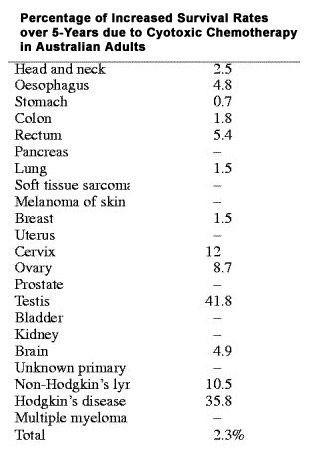Fasting Improves Cancer Chemotherapy Results
Fasting Improves Cancer Chemotherapy
Temporary Fasting of 48 to 60 Hours, Shields Healthy Cells, While Chemo Drugs Target Cancerous Cells.
March 31, 2008 — Fasting prior to cancer chemotherapy treatment may significantly enhance the cancer-killing effects of the drugs while protecting healthy cells from damage.
“The study suggests starvation induces a protective shield around healthy cells, allowing them to tolerate a much higher dose of chemotherapy.”
“The results showed starving laboratory mice for two days prior to chemotherapy treatment protected them from potentially toxic high doses of the drug, and they gained back the weight they lost after treatment.”
Researchers stated: “cancer chemotherapy can kill as many healthy cells as cancerous ones, but inducing temporary starvation increases the cells’ resistance to stress, which may allow doctors to use higher doses of current cancer chemotherapy treatments to make them more effective.”
In the study, published in the Proceedings of the National Academy of Sciences, researchers studied the effects of starvation on cancerous and normal cells.
First, they induced a starvation-related response in yeast cells, making them 1,000 times more protected than untreated cells.
A second test of cancer cells in a test tube and in mice, showed starvation produced between a twofold and fivefold difference in stress resistance between the normal, starvation-treated cells and normal cells. In tests with live mice, of 28 mice starved for 48-60 hours before chemotherapy, only 1 died. Of 37 mice that were not starved prior to treatment, 20 mice died from chemotherapy toxicity.
“We consistently showed that mice were highly protected while cancer cells remained sensitive,” researcher Valter Longo, PhD, of the University of Southern California, says in news release. “If we get to just a 10- to 20-fold differential toxicity with human metastatic cancers, all of a sudden it’s a completely different game against cancer.”
Researchers theorize that genetic cues prompt starved healthy cells to go into a hibernation-like mode that produces extreme resistance to stress. But cancerous cells don’t obey those cues and remain stuck in growth mode.
By using the starvation response to differentiate normal and cancerous cells, researchers say healthy cells may be able to withstand higher doses of existing cancer chemotherapy drugs, but further studies in humans are needed to confirm these effects.
Note By Tom Coghill
June 18,2010
During the testing of initial cancer treatments at St. Theodore’s Hospital of Sagada, we witnessed many positive results such as reduction of inflammation and pain, better clarity of mind and increased patient mobility. It was clear that quality of life is improved with juice fasting for advanced cancer patients. With extraneous tumors, we witnessed tumor coloration change, mass reduction and tumor necrosis. This was encouraging, but we faced one huge hurdle that juice fasting could not overcome in advanced cancer (stage II and I). Although the tumor metabolism was impacted by the reduced blood glucose levels, angiogenesis continued and the tumors started to regrow with the additional blood supply. Before we discovered the effectiveness of the Kelly Cancer Cure in advanced cancers, faced with the limits of the Bruess Cancer Cure, I had considered that chemotherapy would increase damage to the cancer cell and protect the healthy cells. At present the combining the Bruess and Kelly cancer treatments into one protocol seems to offer the greatest opportunity for recovery. (Basically 40 to 50 days of restricted juice fasting with pancreatic enzyme and specific supplements.)
Tests are presently underway in Papua New Guinea. If you consider the chart below the survival rate due to chemotherapy is very low. At the present, most chemotherapy treatments may give a 2 to 5% increase in the your survival rate but at a great cost to health and quality of life. From what I have observed, juice fasting with the addition of pancreatic enzyme has a far higher success rate and improves overall health after treatment. I have always recommend to cancer patient that the obtain a Cat Scan or Ultrasound before starting any holistic treatment. After 40 days retake the tests and see the changes. If the cancer is still growing then consider, chemotherapy radiation or surgery. I has seen some astounding responses to modified juice fasting treatments that defied my belief in what was possible.
Considering the stats, holistic would me my first choice, if I was face with a treatment decision.
If you are interested in the advancements of holistic treatment for advanced cancers, contact Tom Coghill coghill.tom@gmail.com

















Pingback: El Ayunando Mejora los Resultados de Quimioterapia Para el Cáncer | Ayunando
My experience supports this: Even in an anaplastic sarcoma of the breast, when an oncologist planned only palliative chemotherapy (40 dosages), he could find no trace of malignancy after only 2 dosages. This patient did a week’s fast before and again during chemotherapy and followed it up regularly.
Fasting creates a “hunger” within the body. Thus the body would “search” for redundant substances to use: What better than these useless cancer cells?!
Also: Cancer cells are typically weak, as they are not fully adapted to their immediate environment. Excessive nutrition (such as “supplements” risks keeping them alive in circumstances where they otherwise would have succumbed..
There need however not be any adversity: We need to combine fasting with the orthodox treatments for enhanced efficiency and reduced toxicity.
André
Andre,
Do you remember the length of time for the 2 chemo treatments. Assuming mammography was uses to determine tumor mass, what was the mass?
Was it a water fast and for how long? I know this was not your patient but do you remember any more details.
I am a firm believe in integrative medicine with holistic treatment protocols as the primary system. This research and what you have stated indicates that all chemotherapy treatments should be conducted in combination with a fasting protocol. The question are:
1. Can the cellular protection triggered by lowered blood glucose also be triggered with a restricted juice fasting thus giving nutritional support for immune performance.
2. Are certain classes or types of chemotherapy more effective in the catabolic state?
That would be valuable info to any pharmaceutical. Last year I considered that a pharmaceutical company would sponsor research on the system that would enhance drug performance and reduce cellular damage. We hoped that we could provide case studies to stir interest. We actually wrote the proposal and I still have it. Then we discovered pancreatic enzyme and did not need chemotherapy.